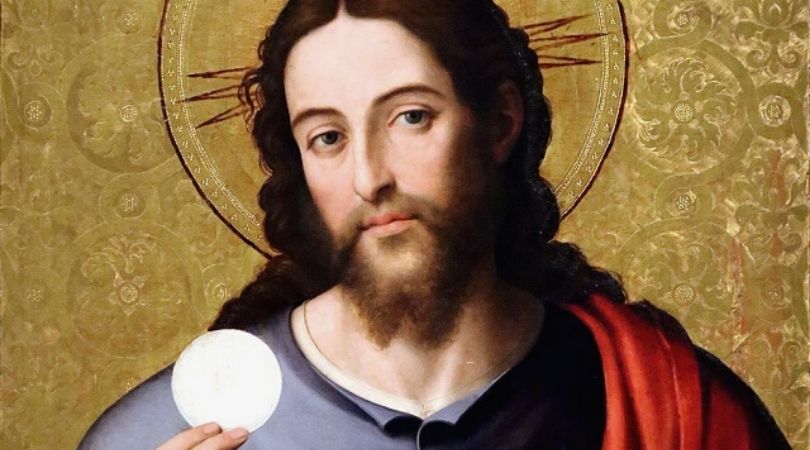US Catholic Women Speak Out Before Vatican Summit, by Patti Armstrong
February 19, 2019Cardinal Joseph Zen: ‘For Love of My People I Will Not Remain Silent’, by Terence P. Jeffrey
February 19, 2019
By Msgr. Charles Pope, February 18, 2019
Original sin is that first sin of Adam and Eve in the Garden of Eden, committed when they ate the forbidden fruit from the Tree of the Knowledge of Good and Evil (Gen 3:1-7). While it clearly involved them both, Scripture and Tradition refer to it formally as the “Sin of Adam” or “Adam’s Sin,” not the “Sin of Adam and Eve.” It is also described as coming to us “through one man,” not “through one man and one woman.” Consider the following quotes from Scripture and the Catechism of the Catholic Church:
-
Like Adam, they [Israel] have broken the covenant—they were unfaithful to me there (Hosea 6:7).
-
Therefore, just as sin entered the world through one man, … death reigned from the time of Adam to the time of Moses, even over those who did not sin by breaking a command, as did Adam (Rom 5:12, 14).
-
For as in Adam all die, so in Christ all will be made alive (1 Cor 15:22).
-
All men are implicated in Adam’s sin, as St. Paul affirms: “By one man’s disobedience many (that is, all men) were made sinners” “sin came into the world through one man …” (CCC # 402).
-
Following St. Paul, the Church has always taught that the overwhelming misery which oppresses men and their inclination towards evil and death cannot be understood apart from their connection with Adam’s sin … (CCC # 403).
-
How did the sin of Adam become the sin of all his descendants? The whole human race is in Adam “as one body of one man.” By this “unity of the human race” all men are implicated in Adam’s sin, as all are implicated in Christ’s justice (CCC # 404).
Again, why just Adam?
I want to propose several answers, some of them somewhat politically incorrect. Not everything I am about to write represents formal Church teaching; some of it is speculation on my part.
Parallelism – St. Paul makes it clear that we are saved by Christ alone. This is because sin came through “one man” and hence we are saved by “one Man,” the Lord Jesus Christ. Just as in Adam all die, so in Christ are all made alive (cf Rom 5:17; 1 Cor 15:22). Parallelism makes it fitting that because we were saved by one Man, we were steeped in sin through one man. This argument is ultimately unsatisfying because it amounts to a kind of post hoc ergo propter hoc argument by starting with the conclusion (we were saved by one Man) and then developing the premise (that it is because one man sinned). The New Testament guides and influences our understanding of the Old Testament, and it should. Hence, there are two Adams, a “man-for-Man” parallelism. In this sense the first sin is fittingly called the “Sin of Adam.”
The Headship of Adam – Scripture teaches of the headship of the husband in marriage (cf Eph 5:22; 1 Peter 3:1; Titus 5:2; Col 3:18). When God ordained marriage, He stated, A man shall leave his father and mother and cling to his wife, and the two of them shall be one (Gen 2:24). The man leads the marriage and is its head, but this makes him ultimately responsible for what takes place in that marriage.
Today, we tend to think of headship as a privilege, but Scripture speaks of it more in terms of responsibility and service (cf Mark 10:41-45; Lk 12:48). Thus, the headship of the husband brings upon him the ultimate responsibility for what happens in his household. This does not mean that his wife is necessarily without guilt, only that that he must answer for it.
I am the head of my parish. As such, if one of my parishioners or staff does something wrong, the bishop calls me and expects me to handle the matter. I am ultimately responsible for what happens in my parish and must account for it, accept shared responsibility for it, and correct it. It may be because I failed to teach properly. Perhaps I did not exercise enough oversight. It may not be entirely my fault, but as head, I must answer for it.
Hence, original sin is called the “Sin of Adam” because as head of the household he bore ultimate responsibility for what took place. When God was looking for them after they had sinned, He did not say, “Adam and Eve, where are you?” He said, “Adam, where are you?” (Gen 3:9) Eve was not without blame, but God called on Adam to render an account. Adam had headship and, in this sense, the first sin is fittingly called the “Sin of Adam.”
The “Complexity” of Original Sin – When we think of the first sin, we tend to think of it simplistically, as simply the eating of forbidden fruit. I suggest that it was more complicated than that and involved Adam a little more than is commonly thought.
Adam had been placed in the Garden of Eden prior to Eve’s creation and had been told to work it and keep it (Gen 2:15). (Some translations say that he is to work in it and guard it.)
After Eve’s creation, she has a somewhat lengthy conversation with the devil, during which he spars with her, tempting her and ultimately causing her to fall. During this time, where was Adam? One would think he wasn’t there because the text does not record him saying anything, but in fact Adam was right there the whole time! One would expect Adam to say to Satan, “Why are you talking to my wife? What are you saying to her? Why are you trying to mislead her?” One would further expect Adam to dispute what Satan was saying and to defend his wife from this temptation and error. Surely, Eve should not have had to answer Satan all on her own. She does well at the outset but then weakens under his onslaught. Why does Adam not step in to protect her and to bolster her strength? Why does he not assist her in this struggle and defend her against this threat? Is his silence not part of the first sin? Is his omission not integral to the fall of them both?
Adam had an obligation to rebuff Satan and to guard his wife and the garden, but he remained passive. As head of the house, Adam had the primary responsibility of defending his household from all error, sin, and threat. Eve should not have had to face Satan alone. Adam was worse than useless; his silence gave strength to Satan’s arguments. Eve was not without sin, but Adam failed to assist her and to provide her the support she needed and deserved.
Thus, the first sin involved more than merely eating the fruit; that was its culmination. Adam’s complicit silence was integral to the fall; it set the stage. In this sense the first sin is fittingly called the “Sin of Adam.”







